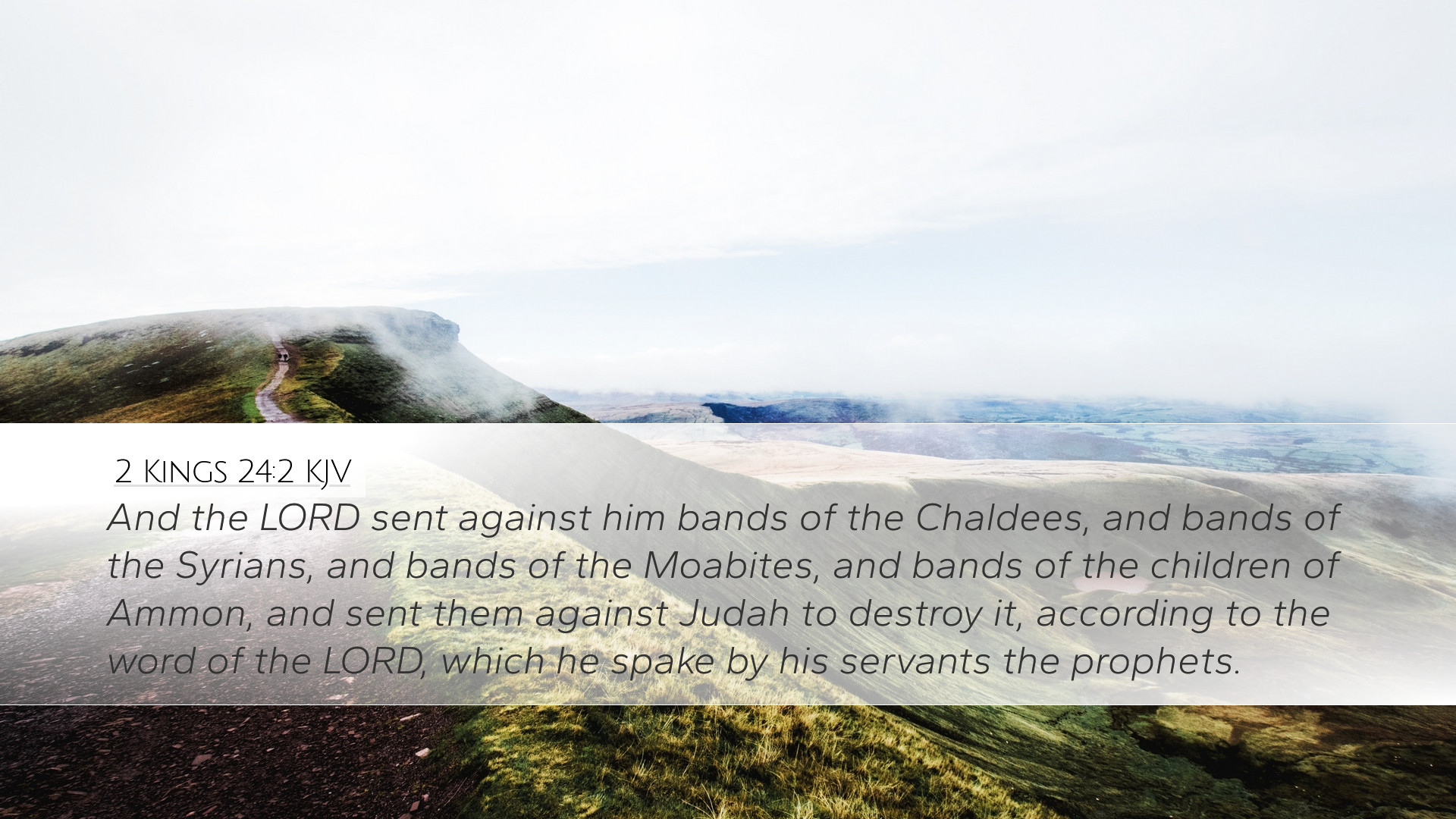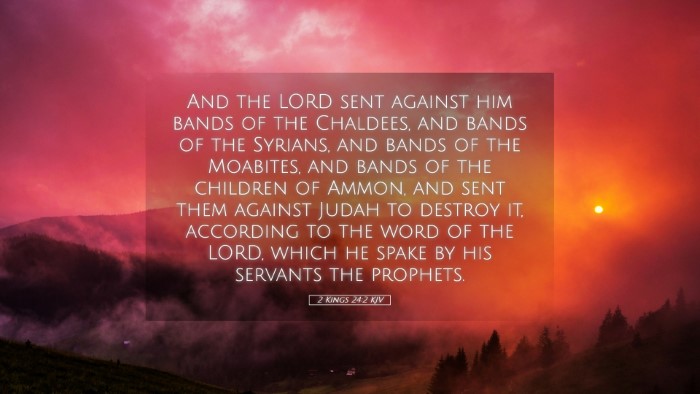Old Testament
Genesis Exodus Leviticus Numbers Deuteronomy Joshua Judges Ruth 1 Samuel 2 Samuel 1 Kings 2 Kings 1 Chronicles 2 Chronicles Ezra Nehemiah Esther Job Psalms Proverbs Ecclesiastes Song of Solomon Isaiah Jeremiah Lamentations Ezekiel Daniel Hosea Joel Amos Obadiah Jonah Micah Nahum Habakkuk Zephaniah Haggai Zechariah Malachi2 Kings 24:2
2 Kings 24:2 KJV
And the LORD sent against him bands of the Chaldees, and bands of the Syrians, and bands of the Moabites, and bands of the children of Ammon, and sent them against Judah to destroy it, according to the word of the LORD, which he spake by his servants the prophets.
2 Kings 24:2 Bible Commentary
Commentary on 2 Kings 24:2
In 2 Kings 24:2, we find a significant verse that encapsulates the Divine judgment and the unfolding historical realities of Israel during the decline of the kingdom of Judah. The verse states:
"And the Lord sent against him bands of the Chaldeans, and bands of the Syrians, and bands of the Moabites, and bands of the children of Ammon, and sent them against Judah to destroy it, according to the word of the Lord, which he spake by his servants the prophets."
Historical Context
This period marks a critical juncture for Judah as it faced mounting external pressures from surrounding nations. The Chaldeans, who later came to be synonymous with the Babylonians, had begun their rise to power under Nebuchadnezzar.
- Matthew Henry notes that the various bands mentioned were instruments of God’s judgment against a nation that had turned away from Him.
- Albert Barnes emphasizes that this was not a random assortment of armies but a divinely orchestrated event in line with prophetic declarations.
- Adam Clarke points out that the involvement of multiple nations signifies the comprehensive nature of God’s judgment against Judah.
Theological Insights
This verse serves as a poignant reminder of the sovereignty of God in the affairs of men. The sending of adversaries to Judah illustrates how God uses earthly kingdoms to fulfill His divine purposes.
- Sovereignty of God: The presence of multiple enemies indicates God's control over all nations. As Henry posits, “no creature can move without God’s government and direction.”
- The Role of Prophecy: The mention of prophets emphasizes the importance of prophetic voices during times of calamity. Barnes underlines that God warns His people before judgment comes, thereby showing His mercy even amidst impending wrath.
- The Nature of Divine Judgment: Clarke elaborates that the adversities faced by Judah were a culmination of persistent disobedience and idolatry, thus showcasing a pattern of divine justice.
Practical Applications
For pastors, students, theologians, and scholars, this verse invites a deeper exploration of how God interacts with nations and individuals today.
- Understanding Judgment: As modern believers, the understanding of judgment calls us to repentance and a renewed commitment to covenantal faithfulness.
- Prophetic Urgency: The historical prophetic messages remind us of the need for contemporary prophetic ministry that holds forth the truth even amidst societal decline.
- Collective Responsibility: The judgment on Judah can be seen as a warning to contemporary nations and communities about the consequences of collective disobedience to God.
Conclusion
In summary, 2 Kings 24:2 serves as a sobering reminder of God’s unyielding justice and sovereignty. Through the lenses of these commentaries, we see the rich tapestry of God’s engagement with His people throughout history. Scholars and pastors alike are encouraged to meditate on this passage, drawing lessons that are timeless and relevant for both personal and communal faith journeys.
As we engage with the text, let us remember the gravity of walking in covenant with the Almighty, recognizing both His mercy and His just character in all things.


